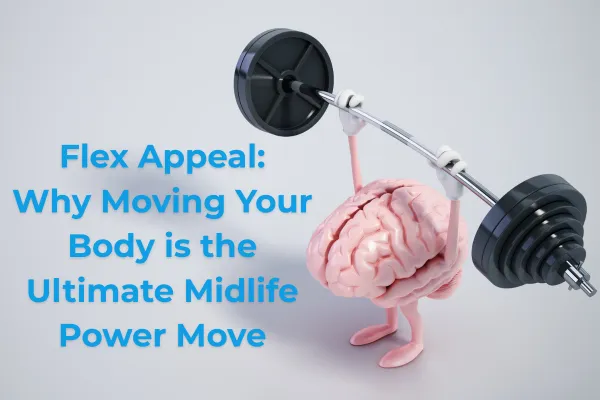
Flex Appeal: Why Moving Your Body is the Ultimate Midlife Power Move
Here’s an unpopular opinion: the best reason to move your body in midlife has nothing to do with your waistline.
It’s your brain.
Your independence.
Your ability to remember where you left your phone, your keys, and maybe even your car.
There’s no argument that movement helps with metabolism, bone density, and muscle tone. And while it can help with weight loss, it’s not really a key factor (nutrition matters more).
What most women don’t realise is that movement plays a critical role in protecting your cognitive health, emotional wellbeing, and overall quality of life, now and for decades to come.
And the best part? You don’t need to spend hours at the gym, become a cardio bunny, or suffer through a million burpees (unless you’re into that…in which case, I tip my hat to you).
Let’s break it down.
Midlife Brain Changes: Not Just in Your Head
Starting at around age 40, women experience a cascade of hormonal changes: oestrogen drops, cortisol rises, and the brain starts to undergo subtle but significant shifts. Areas like the hippocampus (responsible for memory and learning) can actually shrink over time if not properly supported. Research shows that hippocampal volume drops during menopause-related oestrogen decline.
Add in poor sleep, chronic stress, blood sugar dips, and a lack of movement, and suddenly that “brain fog” doesn’t seem so mysterious.
Here’s what the science says:
✅ Regular physical activity increases blood flow to the brain, delivering the oxygen and nutrients it needs to thrive.
✅ Movement stimulates neurogenesis (the growth of new brain cells) and boosts neuroplasticity, which is your brain’s ability to learn, adapt, and form new neural connections.
✅ It also ramps up levels of BDNF (Brain-Derived Neurotrophic Factor), a protein lovingly referred to as “Miracle-Gro” for your neurons. Studies have linked higher BDNF with improved memory and slower cognitive aging.
Translation: movement helps you stay sharper, steadier, and more focused. And it might even help prevent dementia later in life.
Use It or Lose It: Your Muscles and Your Mind
Here’s a slightly terrifying fact: without regular strength training, we lose 3–8% of our muscle mass every decade after 30, and that loss speeds up after menopause.
This isn’t just about feeling “flabby.” Muscle loss affects your balance, bone density, metabolism, and yes, your BRAIN.
Muscle contractions (even small ones) stimulate BDNF production, meaning a quick walk or bodyweight circuit isn’t just helping your body. It’s literally feeding your brain.
And if that's not enough to get you moving, consider this. Women in their 60s have up to twice the Alzheimer’s risk of men—and changes can begin decades earlier!
This isn’t just a vanity project. We’re talking about a simple health investment with massive returns.
What If You Don’t Move?
We get it, you’re busy. You’ve got work, family, plenty of stress, and a to-do list that could probably qualify as a novella.
But here's the thing: skipping movement today has compounding effects tomorrow.
When you don’t move regularly:
🚫 Your brain gets less stimulation and nourishment
🚫 Your muscles weaken, balance worsens, and fall risk increases
🚫 Stress builds up, and sleep quality drops
🚫 Emotional flatness becomes your default. Not because you’re lazy - or even depressed - but because your body isn’t getting what it needs to feel alive
And no, I’m not being dramatic here. Research shows that sedentary adults are at significantly higher risk of cognitive decline and mood disorders, not to mention chronic illness. And poor sleep is strongly tied to cognitive decline.
Remember that loss of oestrogen we keep talking about? Combine that with an insufficient level of movement (aka exercise), and the likelihood of preventable age-related health problems can increase by a pretty big factor.
Mindful Movement: It's Not Just Yoga (But That’s Cool Too)
When I say “mindful movement,” I’m not just talking about downward dogs and floaty music. While I love that stuff from time to time, mindful movement is about much more.
We’re talking about intentional, present movement that connects your body and brain.
Walking without scrolling on your phone.
Stretching with deep breaths.
Strength training with focused awareness of how you feel and move.
These kinds of practices build proprioception (your sense of body awareness), which is crucial for coordination, balance, and injury prevention. And yes, they also help reduce anxiety and boost mood, because your nervous system loves to feel safe and regulated.
You Don’t Need Perfect — You Just Need to Start
The goal isn’t perfection. It’s consistency (is this starting to sound familiar yet? 😎)
You don’t need a fancy programme, a gym membership, or a perfect routine. You just need to move, daily, intentionally, and in a way that feels good enough to repeat. Often.
Start with:
💥 10-minute walks
💥 Dancing while cooking or just because
💥 Floor stretches before bed
💥 Bodyweight squats while waiting for the kettle
Your brain doesn’t care if it’s pretty. It cares that it’s happening.
Don’t Wait for “Later”
“Later” is a dangerous word. Later most often becomes never.
And when it comes to your health, that’s a gamble you can’t afford. Your health won’t wait for a more convenient time, and you’re the only one who can make it happen.
If you’re over 40, now is the exact right time to prioritise movement. Not for how it makes you look, but for how it makes you live.
Because your future self is already cheering you on.
Want personalised strategies that actually work for your lifestyle and energy levels? Book a Menopause Impact Assessment and let’s build a movement plan that supports your brain, body, and your beautiful midlife badassery.
You can book it HERE.
